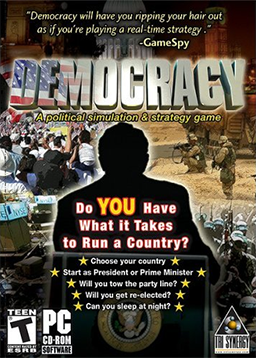Democracy (video game)
| Democracy | |
|---|---|
 |
|
| Developer(s) |
Positech Games Red Marble Games (Mac) |
| Publisher(s) | Positech Games, Tri-Synergy |
| Platform(s) | Linux, Windows, Macintosh |
| Release |
Democracy Positech Games April 17, 2005 Democracy 2 Positech Games December 7, 2007 Democracy 3 Positech Games October 14, 2013 Democracy 3: Africa Positech Games April 12, 2016 |
| Genre(s) | Government simulation |
| Mode(s) | Single player |
Democracy is a government simulation game that was first developed by Positech Games in 2005, with a sequel released in December 2007 and a third game in 2013. The player plays as if they are the president or prime minister of a democratic government. The player must introduce and alter policies in seven areas – tax, economy, welfare, foreign policy, transport, law and order and public services. Each policy has an effect on the happiness of various voter groups, as well as affecting factors such as crime and air quality. The player has to deal with "situations", which are typically problems such as petrol protests or homelessness, and also has to make decisions on dilemmas that arise each turn.
After deciding which nation to play as, the player must win the support of various factions which make up the electorate, including the religious, patriots, parents, capitalists, socialists, liberals, conservatives and others, and thus win the ensuing elections that take place. The player introduces policies and uses sliders to change the amount of government funding, level of a tax or generally the law and regulations in that particular area. Of course, because each individual person belongs to several factions (e.g.: a Poor Conservative Smoker who is a Patriot or a Rich, Socialist person who is also a Drinker), it is practically impossible to control all the voters. Before each general election, two promises are made by the player to the electorate (e.g.: reduce unemployment by 10%). If the player has not kept these promises by the next election, the people become annoyed and cynicism increases.
To make policy changes, the player must spend political capital, which is generated by loyal ministers.
The player must also try to balance the budget and pay off the country's debts without losing votes and causing tax evasion due to very high taxes.
...
Wikipedia
